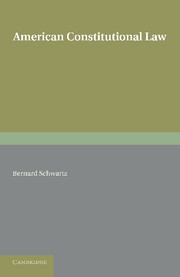Book contents
- Frontmatter
- Dedication
- Contents
- Foreword
- Preface
- PART I THE STRUCTURE
- PART II MODERN DEVELOPMENTS
- Chapter VI The New Federalism
- Chapter VII Presidential Prerogative and the Steel Seizure Case
- Chapter VIII The Changing Role of the Supreme Court
- Chapter IX The Negro and the Law
- Chapter X Civil Liberties and the 'Cold War
- Chapter XI Administrative Law
- Chapter XII The United States and the United Nations
- Appendix: Constitution of the United States of America
- Index of Cases
- General Index
Chapter X - Civil Liberties and the 'Cold War
from PART II - MODERN DEVELOPMENTS
Published online by Cambridge University Press: 05 June 2016
- Frontmatter
- Dedication
- Contents
- Foreword
- Preface
- PART I THE STRUCTURE
- PART II MODERN DEVELOPMENTS
- Chapter VI The New Federalism
- Chapter VII Presidential Prerogative and the Steel Seizure Case
- Chapter VIII The Changing Role of the Supreme Court
- Chapter IX The Negro and the Law
- Chapter X Civil Liberties and the 'Cold War
- Chapter XI Administrative Law
- Chapter XII The United States and the United Nations
- Appendix: Constitution of the United States of America
- Index of Cases
- General Index
Summary
Security and liberty, in their pure form, are antagonistic poles. The one pole represents the interest of politically organized society in its own self-preservation. The other represents the interest of the individual in being afforded the maximum right of self-assertion, free from governmental and other interference. Neither can be given the absolute protection, to the exclusion of the other, which its devotees desire. ‘Absolute rules would inevitably lead to absolute exceptions, and such exceptions would eventually corrode the rules.’
Both security and liberty are essential elements in the functioning of any polity, and their co-existence must somehow be reconciled. The right of a government to maintain its existence—self-preservation—has been characterized as the most pervasive aspect of sovereignty. ‘To preserve its independence, and give security against foreign aggression and encroachment, is the highest duty of every nation,’ declared the United States Supreme Court in 1889, ‘and to attain these ends nearly all other considerations are to be subordinated.’ But, as a member of that tribunal has more recently pointed out, even the all-embracing power and duty of self-preservation is not absolute. The problem is more one of striking a proper balance between the claims of both liberty and security than of seeking wholly to vindicate the one or the other. ‘The demands of [liberty] in a democratic society as well as the interest in national security are better served by candid and informed weighing of the competing interests… than by announcing dogmas too inflexible for the non-Euclidean problems to be solved.’
In their balancing of security and liberty, it cannot be denied that the Founders of the American Republic gave a preferred position to the latter. ‘The American Bills of Rights’, an outstanding student of comparative constitutional law informs us, ‘drew up the inventory—since become classic, of modern liberties.’ The Bill of Rights of the Federal Constitution is contained in the first eight amendments to that instrument, which were adopted almost immediately after the Constitution went into effect, in order to meet widespread popular criticism resulting from the absence of such specific safeguards in the original organic instrument.
- Type
- Chapter
- Information
- American Constitutional Law , pp. 240 - 282Publisher: Cambridge University PressPrint publication year: 2013

